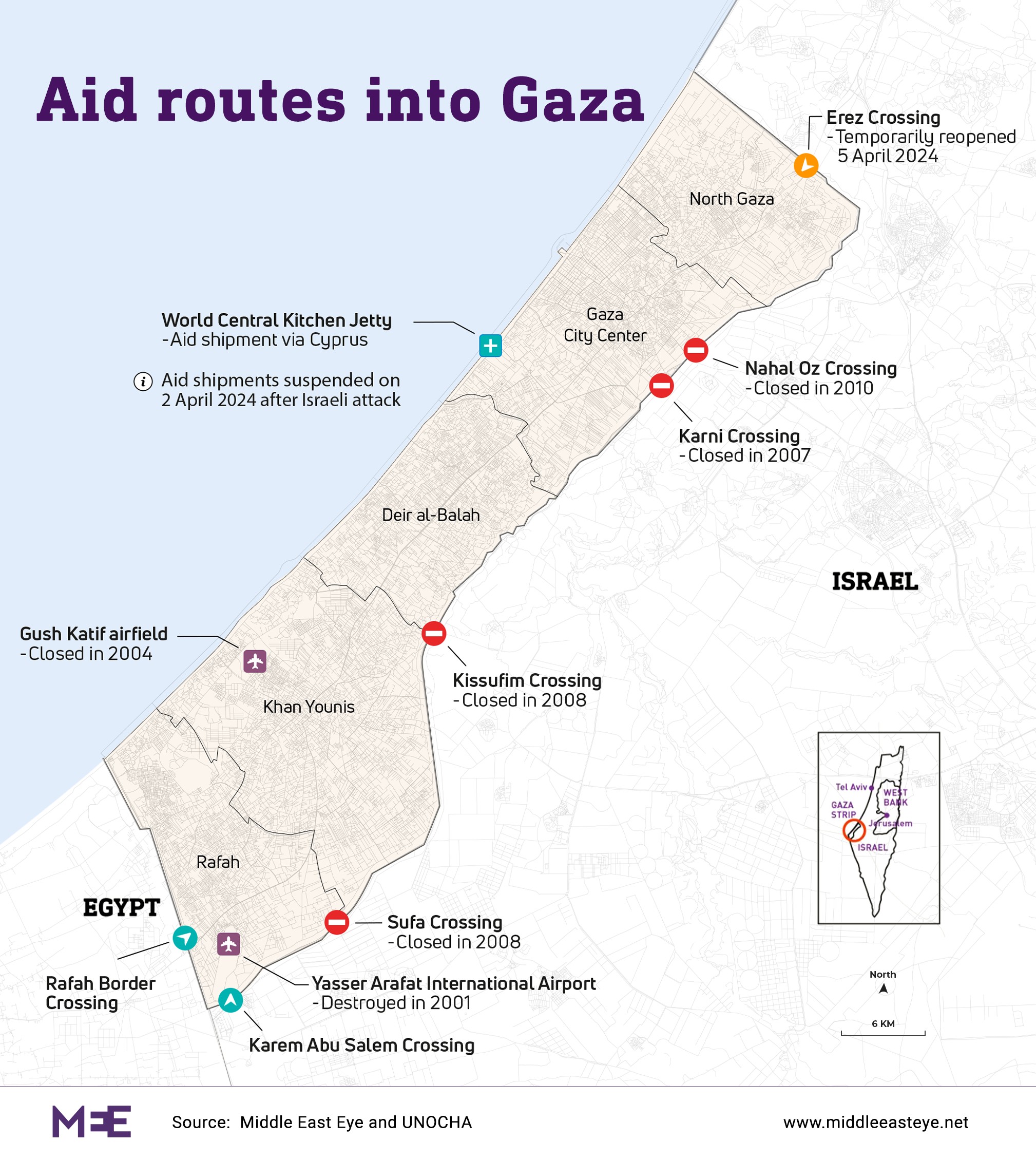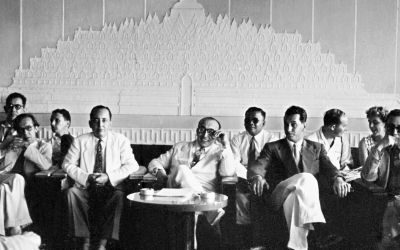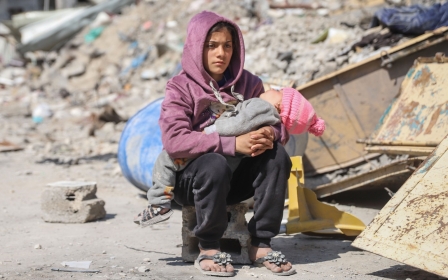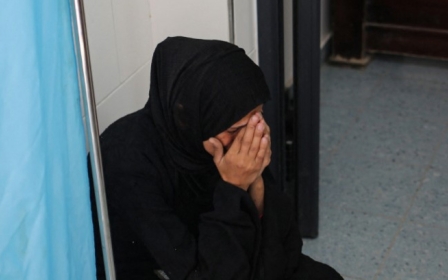Life on hold: Gaza grapples with a 'primitive' existence after half a year of war
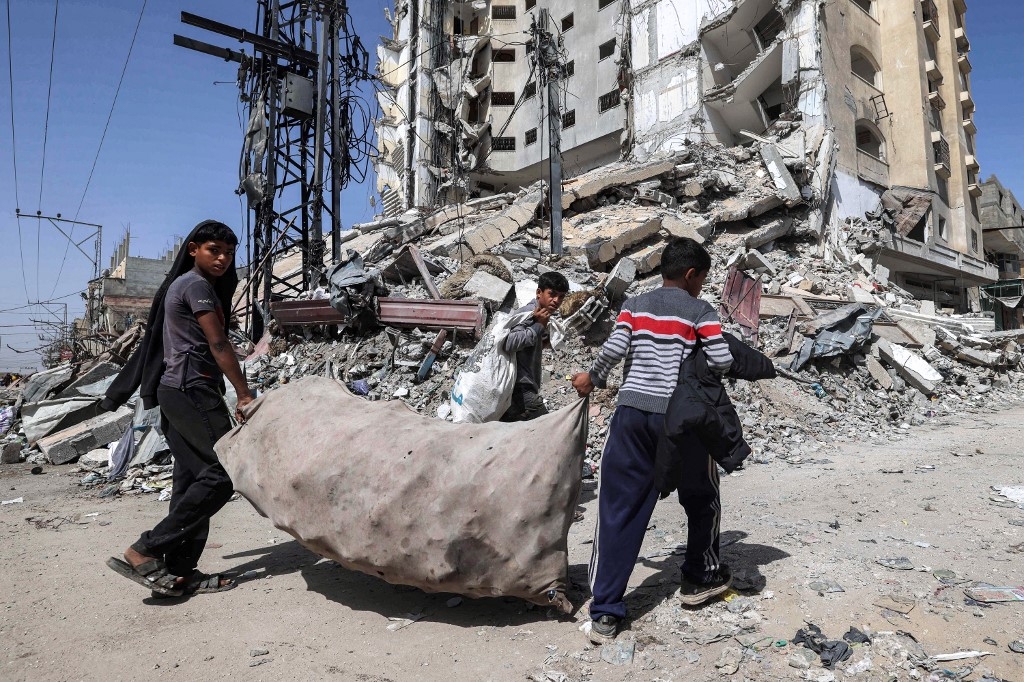
In a yard surrounding a modest chalet in Gaza's Deir al-Balah where her parents took shelter from the Israeli bombardment, one-year-old Iman al-Saqqa takes her first barefoot steps.
When she arrived on 13 October, Saqqa was wrapped in a blanket and cradled in her mother's arms. Following six months of displacement, she now toddles around independently and is beginning to utter her first words.
With around 50 other people, this makeshift shelter became home for Iman and her parents after their apartment in Gaza City was reduced to rubble by an Israeli air strike on 11 October.
"Iman is my first child. A few months before she was born, we had moved to our new apartment where we designed a pink bedroom for her. We had plans to throw a big party on her first birthday. Never did we think that we would not be able to even bake a cake," Suhaila al-Saqqa, Iman's mother, told Middle East Eye.
"We were once planning a luxurious life for her. Instead, I've had to teach her to use the toilet [at a very young age] since we cannot always find diapers for her, and if we do, they are very expensive."
New MEE newsletter: Jerusalem Dispatch
Sign up to get the latest insights and analysis on Israel-Palestine, alongside Turkey Unpacked and other MEE newsletters
On 7 October, Palestinian fighters stormed into southern Israel in a surprise attack, resulting in the deaths of 1,191 Israelis and the seizing of 240 captives. Israel launched a brutal war on the Gaza Strip, with devastating aerial, artillery and naval attacks on the densely populated coastal enclave, followed by a months-long ground invasion.
The Israeli military's stated goal was the release of the captives, destroying Hamas and targeting its members and fighters. But over 70 percent of the more than 33,000 Palestinians killed have been children and women, according to Gaza health officials and international organisations.
The relentless bombardment has resulted in the destruction of around 70 percent of housing units and the loss of 90 percent of private sector jobs in the Gaza Strip over the course of six months.
Education on hold
From her shelter in Rafah in the southern Gaza Strip, Zaina al-Rayyes curiously tracks the news of the upcoming Tawjihi (final high school) exams for her peers in the occupied West Bank.
Displaced Palestinians have gathered in camps across Rafah
Drag the button to see the new camp sites
Before the war on Gaza, she had been gearing up for a pivotal year, setting her sights on being listed among the top students in Palestine's high school examination.
However, as the war extends into its seventh month, she laments that both her academic and social life have been put on hold indefinitely.
"I haven't only lost six months of my life, but an entire year. Tawjihi students in the West Bank have already begun preparing for their exams in around two months, while all I am doing here is moving from one shelter to another," Rayyes, 17, told MEE.
"When the school year started, I set aside my social life and everything else, determined to focus solely on my studies to achieve a high score that would secure me a scholarship at one of the world's esteemed universities abroad. Today, my entire life has been set aside."
'Life has stopped. The only thing ongoing here is death'
- Zaina al-Rayyes
Even if the war ends soon, Rayyes and approximately 620,000 students enrolled in schools in Gaza would not be able to return immediately. At least 351 schools have been completely or partially destroyed during the Israeli bombardment of the strip over the past six months. Among these, 65 are Unrwa-run schools and 286 are government schools, according to the Palestinian Ministry of Education in Gaza.
The remaining schools are serving as shelters for hundreds of thousands of displaced people, whose homes have been either completely destroyed or damaged by the attacks.
"In the limited time I am able to connect to the internet, it has become my hobby to scroll through Facebook groups of Tawjihi students outside of Gaza. I watch them discuss lessons and ask questions about classes and the expected date of exams. I often cry, and my parents wish to do anything to help me continue my education, but they are helpless," said Rayyes, who evacuated her home in Gaza City in the first week of the attack and has since been displaced multiple times.
"Life has stopped. The only thing ongoing here is death. We cannot plan for our next day. How can I plan for my future, where I would study, or what I want to major in? I am not even sure that I will survive to pass Tawjihi."
As of Thursday, more than 5,994 Palestinian students and 266 teachers and administrators have been killed in Gaza.
'Primitive life'
Amid the perpetual sense of insecurity and the relentless sounds of bombardment for six consecutive months, Gaza residents find themselves "battling in yet another war" in their homes and shelters.
With essential supplies like electricity, water, fuel and cooking gas cut off since the first day of the war, every aspect of the residents' daily life becomes a struggle.
Samer al-Agha, originally a resident of Khan Younis in the southern Gaza Strip, currently lives in a tent in Rafah along with his wife, mother and three children.
"During the first four months of the war, there was no cooking gas at all. Everyone in Gaza used either firewood or coal to cook and heat water for bathing," he told MEE.
"But in the next two months, cooking gas has been allowed in, but in very limited amounts. We finally got to buy a gas cylinder at almost five or six times its original price, but it's ok because even firewood has become very expensive."
Without access to running water in any household throughout the Gaza Strip, residents have been relying on water distribution vehicles to refill their tankers for drinking, washing and bathing.
"Since the first day when Israel declared the cutting of our water supply, we knew we would stop having water coming from the tap, but we never thought this would continue for six months. For half a year, we have been heating water on fire and using empty cans of canned food to pour water for bathing," he added.
"To wash our clothes, we cannot use washing machines because we neither have electricity nor water, so we have to do it by hand. One would think these are marginal things but they are not. This is our everyday life, something that we have been sleeping and waking up with for half a year.
"The occupation has made us live a primitive life that even our great grandparents did not live, and it didn't happen gradually. We suddenly found ourselves living it one day."
Middle East Eye delivers independent and unrivalled coverage and analysis of the Middle East, North Africa and beyond. To learn more about republishing this content and the associated fees, please fill out this form. More about MEE can be found here.


